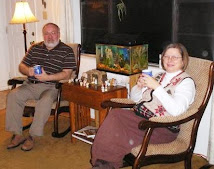πολυμαθής
My son-in-law called me a Polymath!
…but that’s not a bad thing.
No, it’s actually quite a compliment...
You see a polymath has nothing to do with mathematics, or at least not completely. A polymath is learned in many subjects, one of which could be math (or maths outside North America).
The math component of the word confuses us. We associate it with “the science (or group of related sciences) dealing with the logic of quantity and shape and arrangement.”
…but etymologically, the word derives from a Greek word that simply means “to learn.”
The thing I loved most about being called a polymath is that, not only was it a new word for me, but more importantly, it came in an email entitled “New Word,” with the following text: “I came across a new word today, and not only did it remind me of you, you fit the definition of the word...polymath. You are undoubtedly a polymath…”
…and being excited about a new word is a very good thing, in my book.
Now, it’s a great compliment, indeed, to be called a polymath, but I think a lot of that just has to do with keeping my mouth shut about subjects I know little (of which there are a multitude) and spouting off about subjects I’ve studied (of which there are a few). When I do get interested in a subject, I pretty much obsess over it until I know as much as I can about it. I usually then like to tell others about it and will bore anyone within earshot as long as they’ll listen!
Polymaths are described as persons with encyclopedic, broad, or varied knowledge or learning. Synonyms are Renaissance man or Homo universalis in Latin, terms used to describe a person well educated, or who excels, in a wide variety of subjects or fields. With the proliferation of knowledge and the diversity of fields of study in today’s world, there is some question whether any modern person could be a true Renaissance man, in the classical sense of the word.
I am delighted that our sons-in-law, both of whom are extremely bright, capable, creative young men are interested in new words, as are our children. Words are the key to so many things. With them, we learn; we teach; we start, nurture, or restore relationships. We pray, we sing, we praise, we honor, we provide words of comfort and healing. We give of ourselves and receive from others by means of words. We create with words. The Word is among us, with us.
Of course, as soon as I learned this new word, courtesy of my son-in-law, I had to find out more about it, its etymology, its denotation and connotations. I learned of an interesting synonym, polyhistor, which is just as misleading as polymath. The word has nothing to do with history, but means one who is very learned or learned in many areas, just as does polymath.
A few lines of poetry from Thomas Moore deal with the erudite “polys” as follows:
“Off I fly, careering far
In chase of Pollys, prettier far
Than any of their namesakes are,
—The Polymaths and Polyhistors,
Polyglots and all their sisters."
The word is used rarely enough to find its way into dictionaries of rare or unusual words.
It is a delight, this polymath word, but a greater delight still is the person who sent it to me and all that the email represents.
My son-in-law called me a polymath!
…but that’s not a bad thing.
No, indeed…
Tuesday, June 12, 2007
Subscribe to:
Post Comments (Atom)


































No comments:
Post a Comment